5 Best FullEnrich Alternatives & Competitors for Lead Enrichment (2026)
FullEnrich helps you find work emails, personal emails, and mobile phone numbers by checking data from 20+ providers.
It gives strong enrichment results when you already know the person’s name, company, or LinkedIn URL.
However, FullEnrich does not help you find new leads.
It does not let you search by job title, company, industry, location, or any other filters. You must already have the contact, and FullEnrich only enriches it.
It has no lead database, no prospecting search, and no list-building features.
Because of this, many teams look for tools that can find new prospects, create lead lists, use filters, and also offer verified emails and phone numbers.
This guide covers the 5 best FullEnrich alternatives that help you find new leads and get verified emails.
TL;DR – 5 Best FullEnrich Alternatives
- Leadsforge – Find new leads with chat search and get verified emails, phone numbers, and LinkedIn profiles in seconds.
- Kaspr – Great for LinkedIn enrichment and strong EU data.
- Apollo – All-in-one platform with contact data, enrichment, outreach, and AI tools.
- Lead411 – Best for accurate US data with verified direct dials and intent signals.
- UpLead – Simple tool with very clean and accurate B2B emails and real-time verification.
Try Leadsforge now with 100 free credits!
How We Evaluated These FullEnrich Alternatives
To pick the most reliable FullEnrich alternatives for finding verified emails, phone numbers, and leads, we looked at the things that directly affect data quality, speed, and how easy the tool is to use:
- Data accuracy and verification to make sure the emails and phone numbers are correct, active, and updated often.
- Lead search and filtering to quickly find the right people using job title, company size, location, or industry.
- Pricing and scalability, including how much each user pays, how credits work, and how many contacts you can export.
- Automation and enrichment workflows, such as bulk uploads, list building, and pushing leads to your CRM or outreach tools.
- Pricing clarity on credit use, API limits, or hidden costs, so you always know what you’re paying for.
Each tool was reviewed based on how well it helps you find verified contacts, grow your pipeline faster, and avoid the limits of FullEnrich.
5 FullEnrich Alternatives To Find Verified Emails
1. Leadsforge – Chat-Based Lead Generation
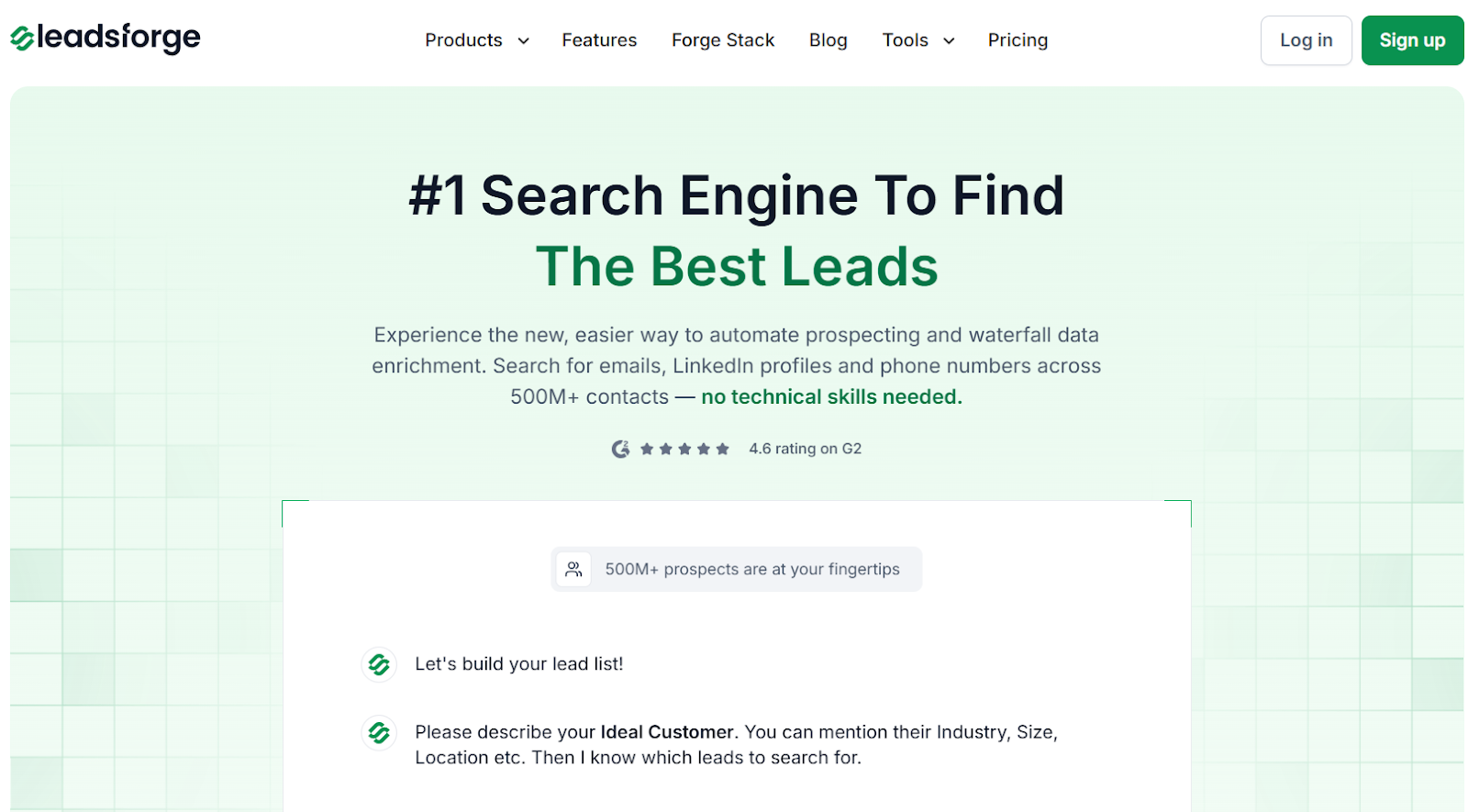
Leadsforge is a chat-based lead generation tool that helps you find verified emails, phone numbers, and LinkedIn profiles from 500M+ contacts.
Unlike FullEnrich, which only enriches contacts you already have, Leadsforge actually finds new leads for you.
You simply describe your ideal customer in plain words (example: “CEOs of SaaS companies in Atlanta”), and it creates a complete verified lead list in seconds.
It also gives you lookalike companies, competitor followers, buying signals, and instant enrichment, all inside one chat interface.
Here’s what you get with Leadsforge:
- Find new leads based on your ICP using a simple chat input
- Get verified emails, LinkedIn profiles, and phone numbers
- Waterfall enrichment checks multiple sources automatically
- Find lookalike companies
- Find followers of any company page
Why Leadsforge is a Better FullEnrich alternative?
If you want both lead discovery and enrichment in one tool, Leadsforge is a better choice.
Pros and Cons of Leadsforge
Leadsforge Pricing

- $49/month, includes 2,000 export credits
- Yearly: $588/year, 28,000 credits upfront
- Unused credits rollover
Try Leadsforge now with 100 free credits!
2. Kaspr – European Contact Data & LinkedIn Chrome Extension
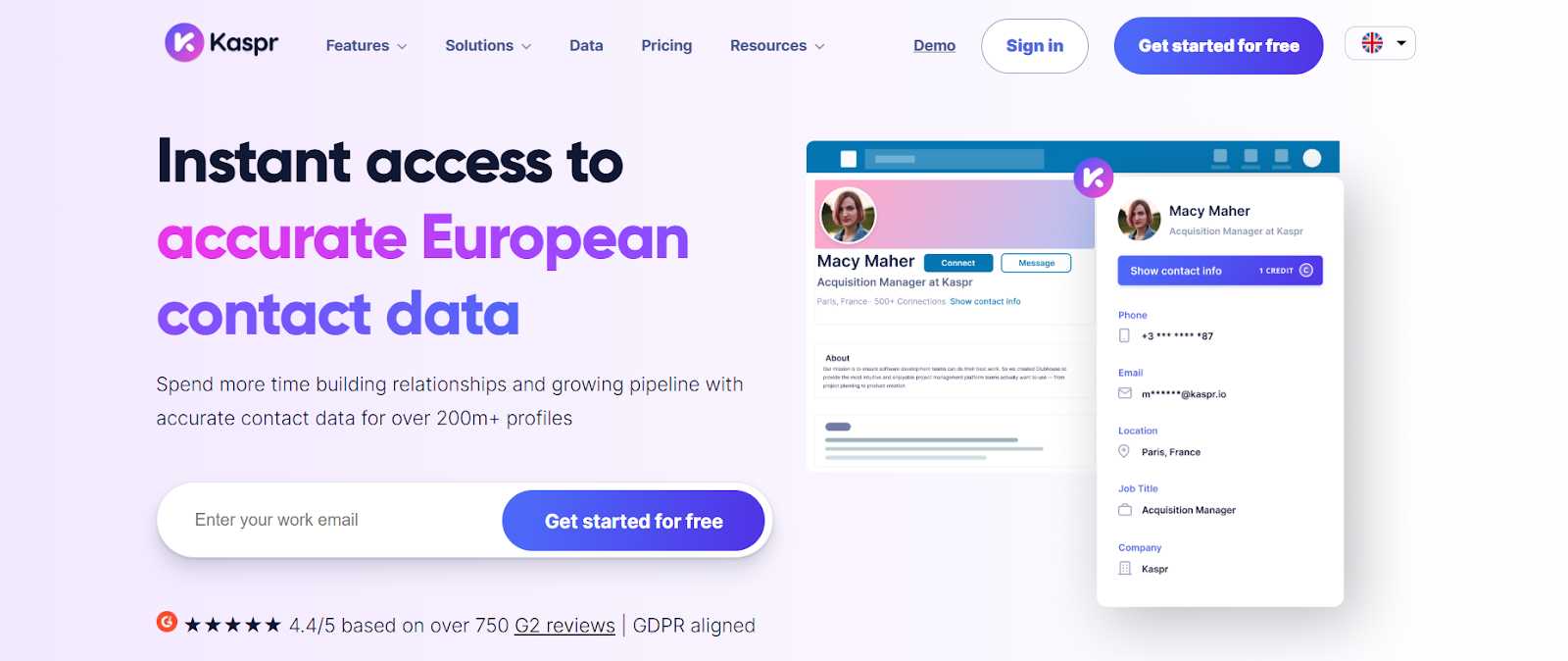
Kaspr is a prospecting tool built for getting accurate European phone numbers and emails in one click.
It works mainly through its LinkedIn Chrome Extension, which reveals contact data for prospects while you browse LinkedIn, Sales Navigator, or Recruiter Lite.
Unlike FullEnrich (which only enriches existing contacts), Kaspr helps you find contact details directly during prospecting and lets you enrich lead lists in bulk.
Here’s what you get with Kaspr:
- Find verified European phone numbers and emails (500M+ data points)
- Get contact data instantly using the LinkedIn Chrome Extension
- Bulk enrich your CSV files
- Enrich contacts from LinkedIn lists, groups, posts, and events
- Real-time verification from 150+ data sources
Why Kaspr is a Better FullEnrich alternative?
Kaspr is a strong alternative if you mainly target European markets and need accurate phone numbers, especially direct dials.
While FullEnrich requires you to upload existing data, Kaspr lets you reveal contact details directly on LinkedIn and bulk enrich new lead lists.
Pros and Cons of Kaspr
Kaspr Pricing
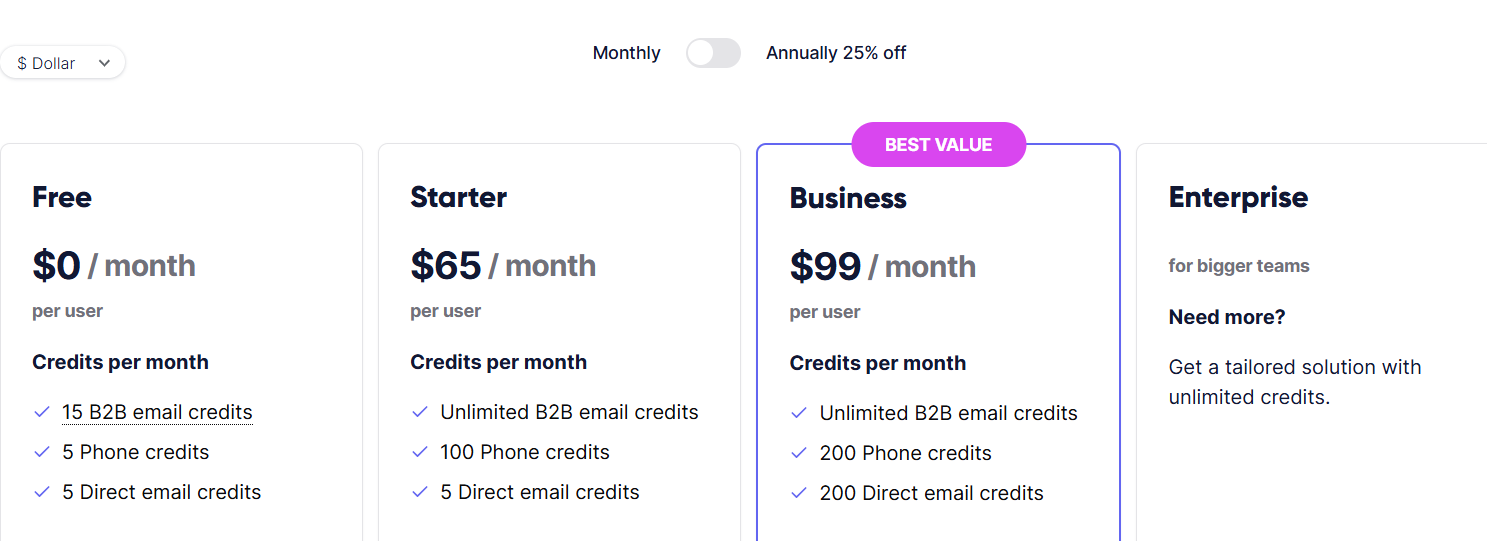
- Free Plan – $0/month: 15 B2B email, 5 phone, and 5 direct email credits. Includes Chrome Extension, lead management, CSV upload, and enrichment automations.
- Starter – $65/month per user: Unlimited B2B emails, 100 phone, and 5 direct email credits.
- Business – $99/month per user: Unlimited B2B emails, 200 phone, and 200 direct email credits.
- Enterprise – Custom pricing: Unlimited everything with intent data, advanced Salesforce enrichment, SSO, and enterprise-level compliance.
Related Read: 100+ Kaspr Review Analyzed: Here's What We Found
3. Apollo – All-in-One Sales Platform With Data, Enrichment & Outreach

Apollo is an all-in-one sales platform that gives you lead data, enrichment, outreach, inbox tools, and deliverability features in one place.
It lets you find new leads, enrich them, email them, call them, and manage sending reputation, all inside one platform.
Apollo also provides strong deliverability tools such as email warmup, inbox ramp-up, domain authentication help, mailbox health scoring, and a full deliverability suite.
These features help your cold emails reach inboxes instead of spam.
Here’s what you get with Apollo:
- Enrich leads, accounts, CRM records, and CSVs
- Multichannel outreach (email, calls, LinkedIn tasks)
- Email warmup & inbox ramp-up for better deliverability
- Domain authentication support (SPF, DKIM, DMARC)
- Deliverability Suite to monitor mailbox health and spam issues
- AI research, AI message writing, AI call insights
Why Apollo is a Better FullEnrich alternative?
Apollo is a better alternative if you want lead discovery, enrichment, outreach, and deliverability tools in one platform.
Pros and Cons of Apollo
Apollo Pricing
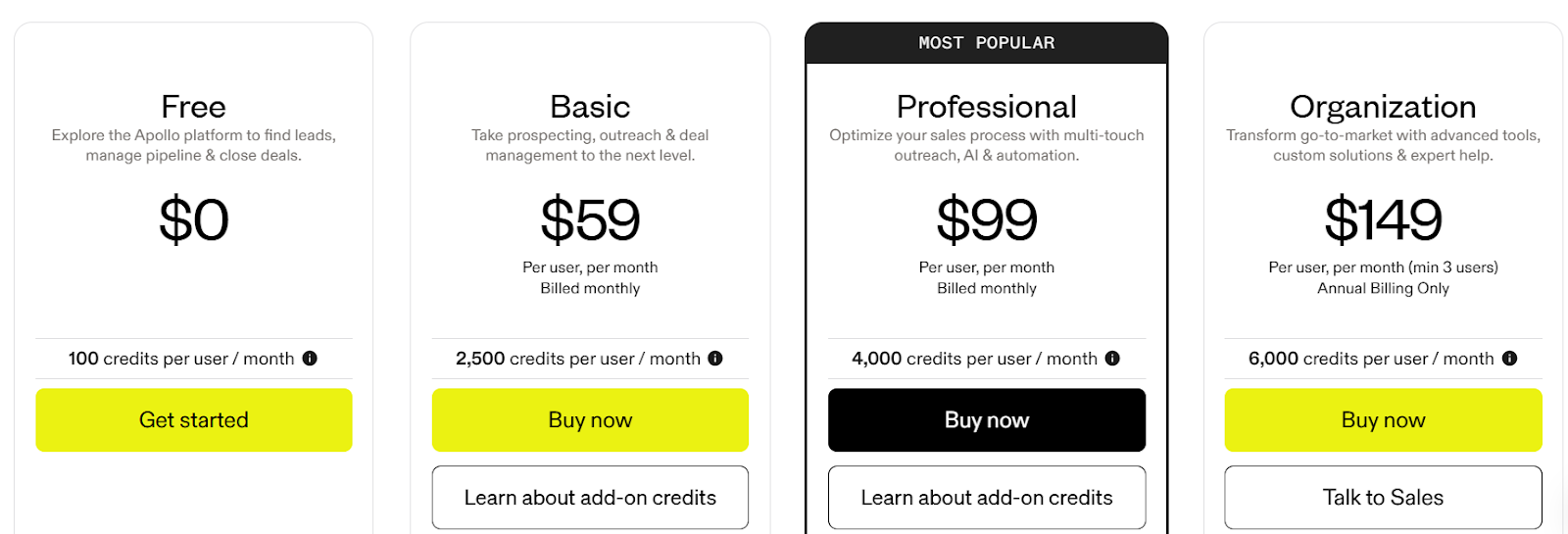
- Free Plan – $0/month: 100 credits, Gmail/Outlook integration
- Basic Plan – $59/month: 2,500 credits, enrichment + CRM sync
- Professional Plan – $99/month: 4,000 credits, AI research + dialer
- Organization Plan – $149/month: 6,000 credits, 15 mailboxes + analytics
4. Lead411 – Unlimited B2B Leads With Triple-Verified Emails & Intent Signals
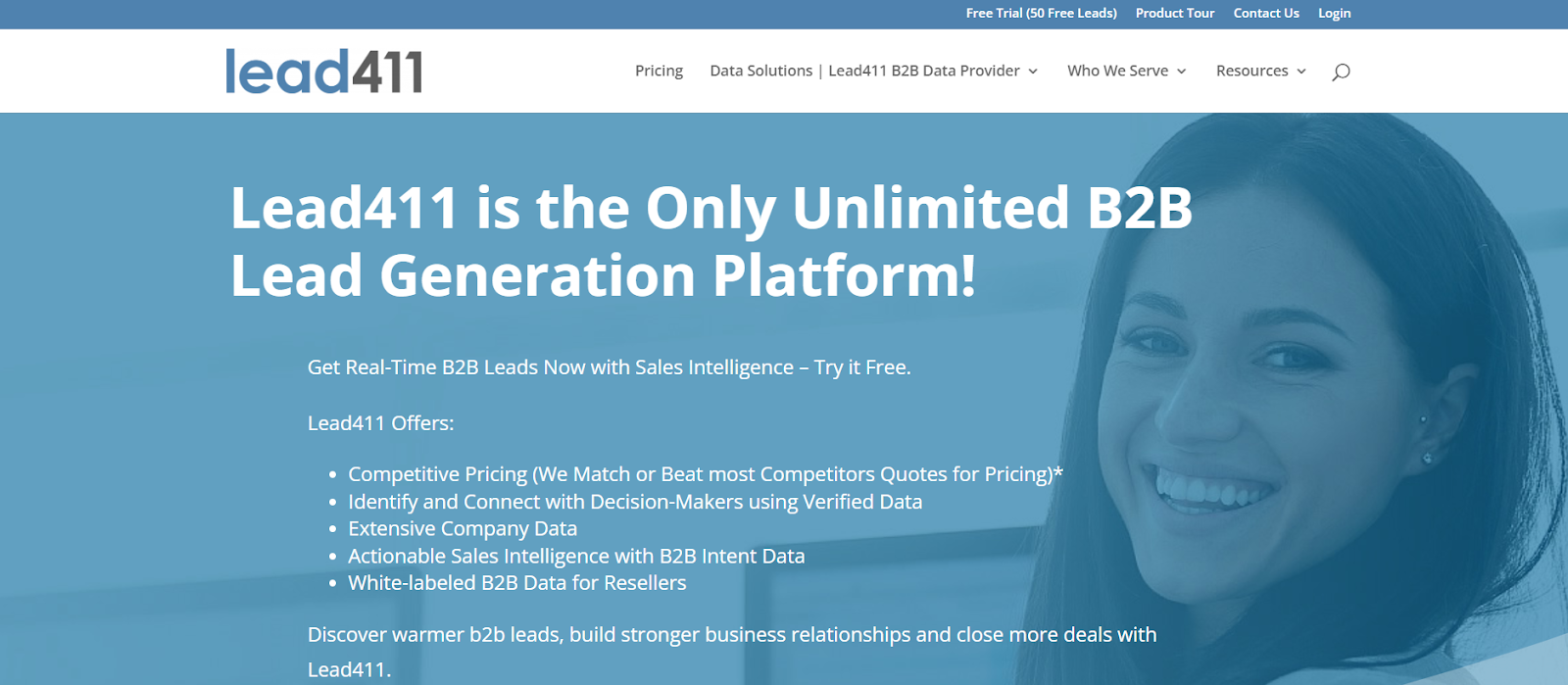
Lead411 is a B2B lead generation and sales intelligence platform that helps you find verified emails, direct-dial phone numbers, and growth intent signals.
It is known for its triple-verified emails, double-verified phone numbers, and unlimited search & export options on select plans.
Here’s what you get with Lead411:
- Triple-verified emails (SMTP, AI, human, open validation)
- Double-verified direct-dial mobile numbers
- Unlimited searches and exports on select plans
- Growth intent signals (hiring, funding, expansion, exec moves)
- Bombora buyer intent (Pro/Blaze plans)
- AI search assistant
Why Lead411 is a Better FullEnrich alternative?
Lead411 is a better alternative if you want lead discovery, verified data, intent signals, and outreach in one platform.
Pros and Cons of Lead411
Lead411 Pricing
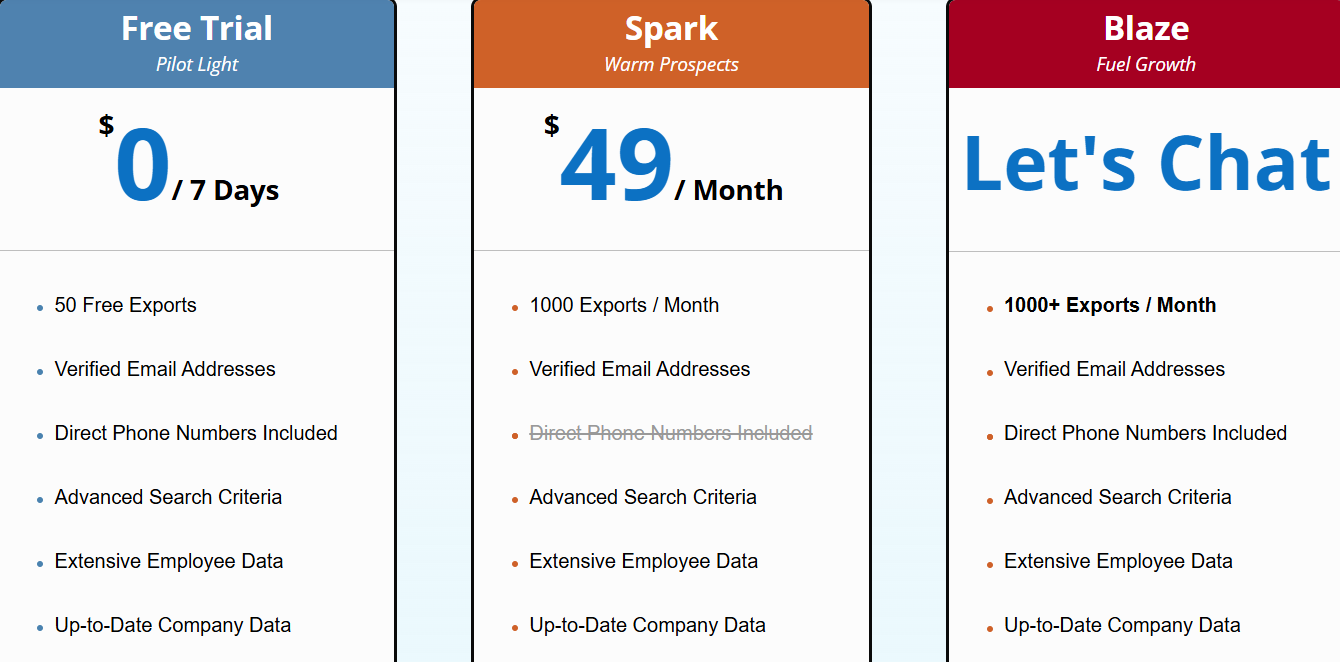
- Free Trial – $0 (7 days), 50 free verified leads
- Spark – $49/month, 1,000 exports/month
- Blaze – Custom pricing, 1,000+ exports/month
Also Read: 5 Best Lead411 Alternatives & Competitors for Finding B2B Data
5. UpLead – Real-Time Verified Leads With 95% Accuracy Guarantee
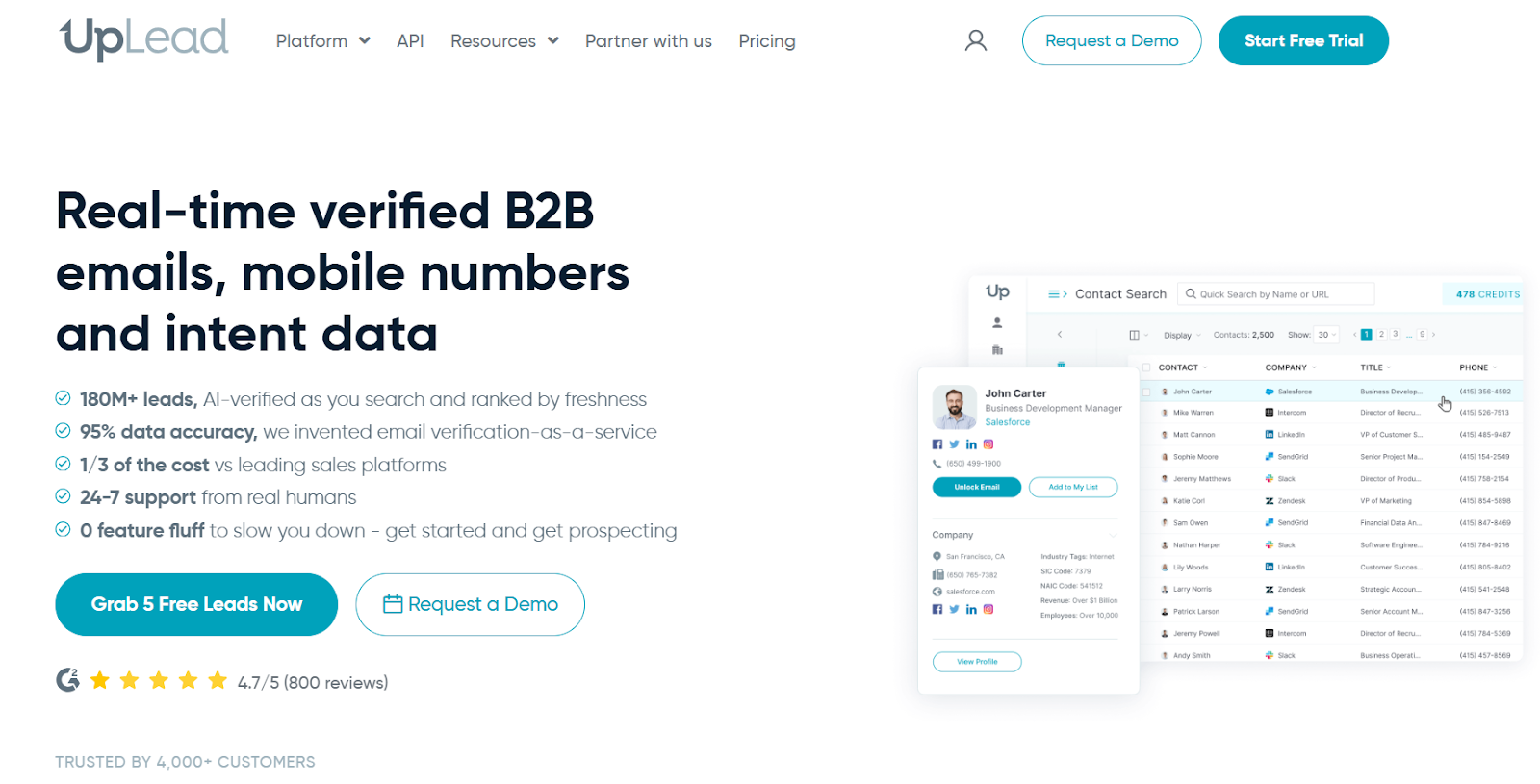
UpLead is a B2B lead generation and data intelligence platform known for its 95%+ accuracy guarantee, real-time verification, and clean, fresh data.
Unlike FullEnrich, which only enriches contacts you already have, UpLead helps you find new leads, verify them instantly, and export them with guaranteed accuracy.
UpLead also offers 160M+ contacts, real-time email checks, mobile/direct dial numbers, technographics, buyer intent data, and an API for enrichment.
Here’s what you get with UpLead:
- Real-time verified emails with a 95% accuracy guarantee
- Bulk lookup for thousands of leads
- Chrome Extension to find emails while browsing
- API for company, person, and combined enrichment
Why UpLead is a Better FullEnrich alternative?
UpLead is a stronger FullEnrich alternative if you want lead discovery, real-time verification, intent data, technographics in one platform.
Pros and Cons of UpLead
UpLead Pricing
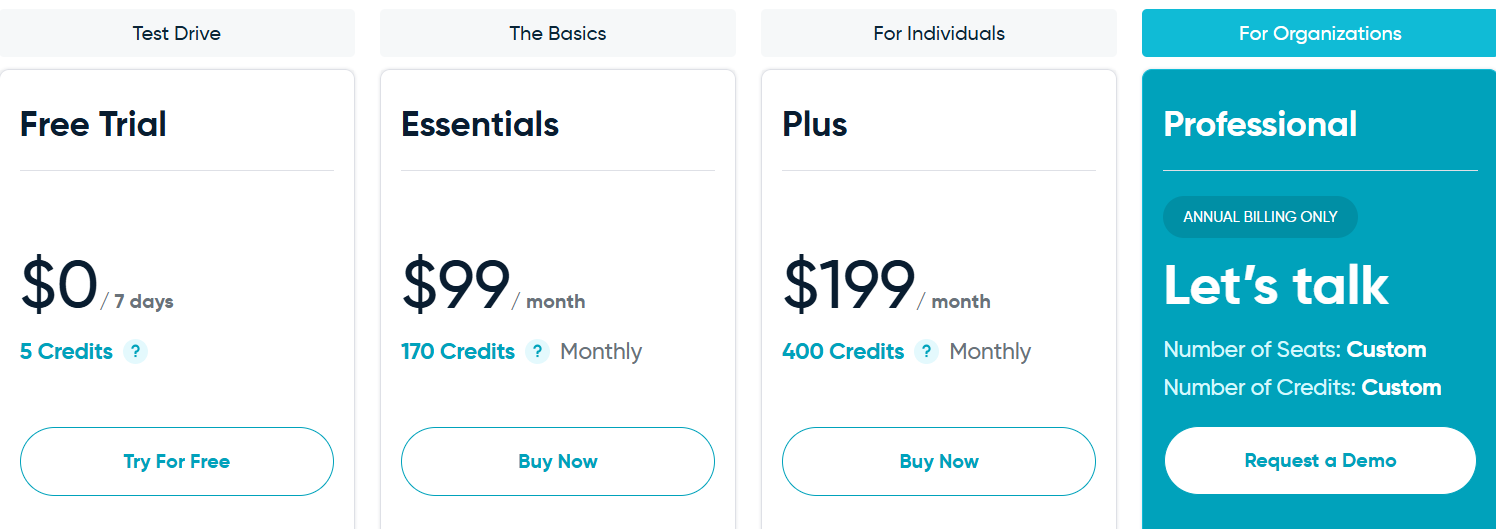
- Free Trial – $0 (7 days): 5 credits, verified emails, mobile phones, Chrome Extension
- Essentials – $99/month: 170 credits, verified emails, mobile phones, CRM integration
- Plus – $199/month: 400 credits, data enrichment, technographics, advanced filters
- Professional – Custom pricing: Buyer intent data, full API access, team management, dedicated support
Which FullEnrich Alternative Should You Choose?
Each tool is strong for different reasons, some for data accuracy, some for outreach, and others for global coverage or intent signals.
- Apollo is ideal if you want one platform for lead discovery, enrichment, outreach, and deliverability tools.
- Lead411 fits teams that want unlimited searches, real-time verified data, and deep intent/Growth Intelligence.
- Kaspr works best if you need verified European phone numbers directly from LinkedIn.
- UpLead is perfect for teams that want 95%+ accuracy with real-time verified data and strong technographics.
- Leadsforge is the best choice if you want to simply describe your ICP and get verified leads instantly, without extensions, filters, or complex setup.
If you want a faster, simpler way to find and enrich verified B2B leads without the complexity, try Leadsforge.
You get verified emails, phone numbers, LinkedIn data, and intent-based signals in seconds.
Try Leadsforge today and get 100 free credits!
Frequently Asked Questions
1. What does FullEnrich do?
FullEnrich is a contact enrichment tool, meaning it only enriches contacts you already have. It does not find new leads or provide prospecting.
2. Why would someone look for a FullEnrich alternative?
Because many teams want both lead discovery and enrichment in one workflow. FullEnrich only handles enrichment, so users often turn to tools that offer prospecting, outreach, or intent signals.
3. Which alternative is best for finding new leads?
Leadsforge, Lead411, UpLead, Kaspr, and Apollo, all help you discover new leads.
4. Which tool is most accurate for enrichment?
UpLead and Lead411 both offer very high verified data accuracy. Leadsforge also provides instant verified leads based on your ICP.
5. Which FullEnrich alternative is best for Europe?
Kaspr is the strongest option for GDPR-compliant European phone numbers and LinkedIn-based prospecting.
